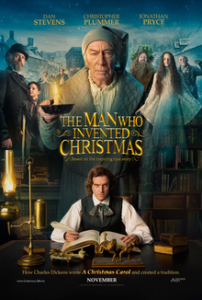The Man Who Invented Christmas
Posted on November 21, 2017 at 5:24 pm
B +| Lowest Recommended Age: | Middle School |
| Profanity: | Mild language |
| Alcohol/ Drugs: | Drinking, drunkenness |
| Violence/ Scariness: | Ghosts, some scary surprises, child labor and abuse |
| Diversity Issues: | None |
| Date Released to Theaters: | November 22, 2017 |

The story is so deeply embedded in our culture that it is difficult to recognize how revolutionary it is. The idea of time travel was considered an enormous innovation in Mark Twain’s A Connecticut Yankee in King Arthur’s Court, published more than 40 years later, but Dickens had Scrooge go back in time to see his past. It is based on the idea that a man could change and would want to change based on an honest look at his childhood trauma and choices made over the years, half a century before Freud. “The Man Who Invented Christmas” gives us a sometimes light-hearted but always warm-hearted look at the man who created Ebenezer Scrooge and the Ghosts of Christmas Past, Present, and Future. We see how the story came together based on what Dickens saw and felt and how writing the story helped him to understand and reconcile his own past.
Dickens (Dan Stevens of “Downton Abbey” and “Beauty and the Beast”) is one of the most critically acclaimed and popular authors in the world, touring America to cheering audiences. Or he was, until he had three flops in a row, just as bills are mounting for renovations on his house, his wife tells him their fifth child is on the way, and his charming but feckless and irresponsible parents arrive for a visit. He desperately needs money, but worries that he is completely out of ideas. His hand remains poised over the paper, its only mark a blob of ink that drops from the feather pen to reproach him because no words are appearing.
It is always difficult to portray the work of a writer because it is all internal and you run the risk of boring the audience with scenes of someone sitting at a desk. Director Bharat Nalluri, working from a script by Susan Coyne, wisely takes our hero out into the world and we have the pleasure of seeing the hyper-alertness artists bring to the world. Whether it is jotting down the name of the waiter (Marley), eavesdropping on the new maid telling ghost stories to his children, watching his young nephew, whose leg is in a brace, or listening to complaints about the poor from a wealthy man exiting the theater, Dickens is constantly creating his characters from life. And when he conjures them up, he makes them real for himself before he makes them real to the reader. Christopher Plummer first appears as a lone mourner at a burial, sharply reminding the clergyman that he isn’t paying by the hour so there’s no reason to drag out his remarks. And then he reappears in Dickens’ wonderfully vivid imagination as Scrooge.
This is not the gritty, grimy Victorian world we have seen in many films, including those based on Dickens’ books. Nalluri echoes the magic lantern shows Dickens’ father enchanted him with as a child in the glowing colors of wintry London. As he did in “Miss Pettigrew Lives for a Day,” he shows a deft skill in moving a large, colorful cast in and out of the story, maintaining a slightly heightened, romantic, but still grounded tone. Stevens holds the center together ably, often on the edge of being frantic but with a joy in storytelling. One especially sweet scene has him delighting his children with the same imagination that continues to thrill audiences and makes this lightly fictionalized peek at him filled with charm and delight.
Parents should know that this movie includes some mild language, mention of pregnancy, drinking and drunkenness, and some child labor and abuse and bullying.
Family discussion: What people and situations around you can inspire your stories? Why did he change his mind about his father? Whose burden can you lighten?
If you like this, try: the many films of the story, especially the Muppet, Mr. Magoo, Alastair Sim, and MGM versions.
